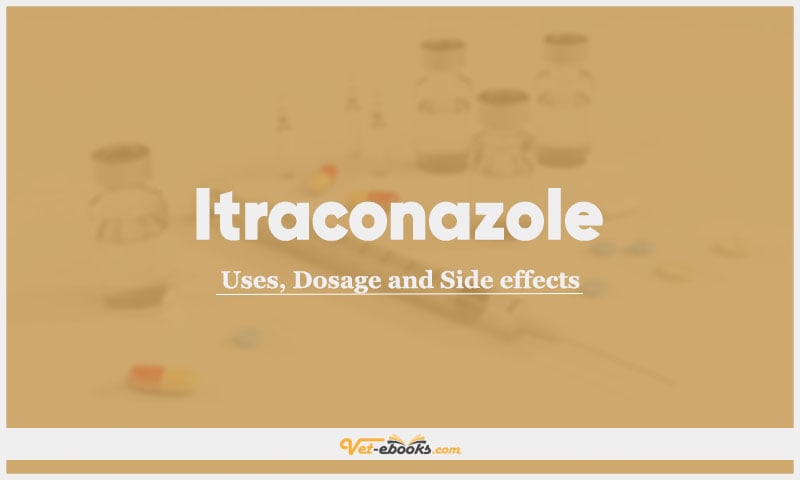Itraconazole In Dogs & Cats: Uses, Dosage and Side Effects

Overview
- Triazole antifungal agent that inhibits the cytochrome systems involved in the synthesis of ergosterol in fungal cell membranes, resulting in an increase in cell wall permeability and cellular content leakage.
Uses of Itraconazole
- Aspergillosis, candidiasis, blastomycosis, coccidioidomycosis, cryptococcosis, sporotrichosis, histoplasmosis, dermatophytosis, and Malassezia treatment.
- Itraconazole is approved as an oral solution for the treatment of Microsporum canis dermatophytosis in cats, and it has been used effectively to treat ringworm in Persian cats without clipping.
Dose of Itraconazole in Dogs and Cats
Dogs, Cats:
- General use: 5 mg/kg p.o. q24h. 4–20 weeks of treatment may be needed, dependent upon culture results.
- Pulse dosing (7 days on, 7 days off repeated x3) described for dermatophytosis in cats.
Drug Dosage Calculator
You Should Give:
Side Effects of Itraconazole in Dogs and Cats
- Vomiting, diarrhoea, loss of appetite, excessive salivation, sadness and apathy, abdominal pain, hepatic toxicosis, ulcerative dermatitis, limb oedema, and serious skin drug eruptions have all been recorded.
- It seems likely that the dose will affect how well the adrenal glands work (like what has been said about ketoconazole).
Contraindications of Itraconazole in Dogs and Cats
- Pregnancy.
- Avoid use if liver disease is present
Some Notes:
- Antifungal imidazoles and triazoles inhibit the metabolism of antihistamines (especially terfenadine), oral hypoglycemics, antiepileptics, cisapride, ciclosporin, and glucocorticoids in humans.
- It is known that itraconazole enhances the bioavailability of ciclosporin in cats, despite the fact that this effect has not been as thoroughly studied in veterinary species.
- Antacids, omeprazole, H2 antagonists, and adsorbents may inhibit itraconazole absorption.
- Itraconazole may increase plasma concentrations of digoxin, benzodiazepines, glucocorticoids, and vincristine.
- In the data leaflet, concurrent administration with cefovecin or tolfenamic acid in cats is discouraged.
Tip
Do You Want To Increase Your Veterinary Knowledge and Practical Skills?
You Can Now Browse and Download +3000 Books For Veterinary Professionals & Students Online.
Download Veterinary Books


















